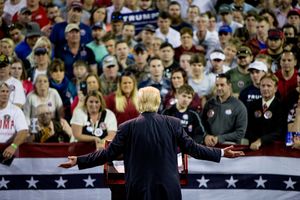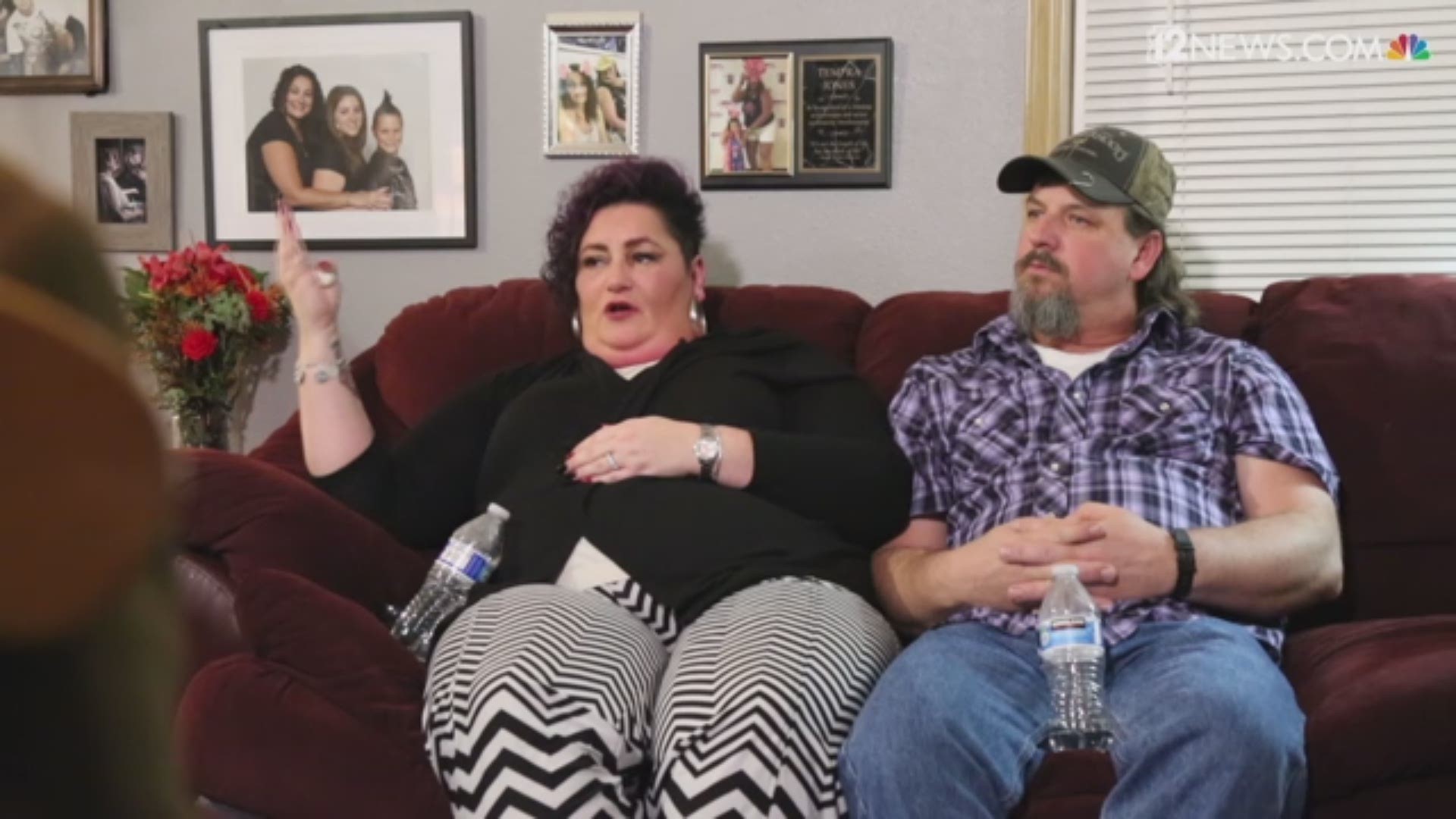WASHINGTON — Racking up a string of victories in Super Tuesday contests, Republican Donald Trump and Democrat Hillary Clinton solidified their claims as their party's likely presidential nominee — but the GOP faces fractures and the Democrats an enthusiasm gap in an election that has upset the early expectations.
Strong showings in the dozen states that held primaries and caucuses Tuesday strengthened the prospect that the November election will end up pitting Trump's blustery populism against Clinton's long record of liberal advocacy. As ballots still were being counted in some states, Clinton was sweeping much of the South, winning Alabama, Arkansas, Georgia, Tennessee, Texas and Virginia. Trump won not only in the Northeast, carrying Massachusetts, but also across the South — in Alabama, Arkansas, Georgia, Tennessee and Virginia.
Republican Sen. Ted Cruz won the primary in Oklahoma and in his home state of Texas. Democrat Sen. Bernie Sanders won the primary in Oklahoma and in his home state of Vermont.
One lesson learned in this surprising campaign is that tax audits and FBI investigations, intemperate exchanges and shifting voter sentiments could create new obstacles on the paths that the two front-runners are mapping to the national political conventions in July.
Here are a five other things we've learned in the opening series of contests, capped by the most delegate-rich night of the season Tuesday.
1. The GOP is fracturing
For a sense of just how fractured the GOP is, consider this: The top Republicans in the House of Representatives and the Senate went before reporters on Capitol Hill Tuesday to denounce the stance taken by the GOP's likely presidential nominee.
There were spurred by Trump's initial failure to denounce white supremacist groups that are embracing his candidacy.
"There has been a lot of talk in the last 24 hours about one of our presidential candidates and his seeming ambivalence about David Duke and the KKK, so let me make it perfectly clear," Senate Majority Leader Mitch McConnell, R-Ky., said. "That is not the view of Republicans who have been elected to the United States Senate, and I condemn his views in the most forceful way."
House Speaker Paul Ryan, R-Wis., declared at a separate news conference: "This party does not prey on people's prejudices."
Trump has never sought or served in public office before. He hasn't even been a reliable Republican voter in the past, and he's regularly contributed to Democratic and Republican campaigns. But it's not his political history but his unpredictable positions and divisive rhetoric that alarm the GOP establishment.
Some view Trump's prospective nomination as a sort of hostile takeover, although they so far have failed to devise a way to block him or even coalesce effectively behind a single rival to challenge him head-to-head. As a nominee, they fear he not only would be crushed in a landslide but also would undermine Republican candidates down the ballot — including those in a swing states trying to hold a half-dozen Senate seats crucial to keeping GOP control. An anti-Trump super PAC called Our Principles is ramping up its operations.
Now there's a sort of political parlor game of asking Republican officeholders whether they would vote for Trump if he is their party's nominee. In a new ad, the Democratic congresswoman challenging Arizona Sen. John McCain includes a clip that shows McCain saying he would. While the real-estate mogul in recent days was endorsed by his first sitting governor (Chris Christie of New Jersey) and senator (Jeff Sessions of Alabama), Nebraska Sen. Ben Sasse says he would vote for a third-party candidate instead.
Not that he has a particular one in mind yet.
2. Democrats face an enthusiasm gap
In every contest leading up to Super Tuesday, Democratic turnout has been way down while Republican turnout was way up. Trump brags that's good news for Republicans. "We've actually expanded the party," he said Tuesday night.
In South Carolina, 367,000 people voted in the Democratic primary, a 30% decline from the party's last contested primary, in 2008. But 603,000 Republicans voted in the Republican primary, a 20% increase from the last contested GOP contest, in 2012.
In Nevada's Republican caucuses, 34,000 people supported Trump. That's more than the entire GOP turnout four years ago.
Election scholars caution that high turnout during the primaries doesn't necessarily translate to an advantage in November. In 2000, Republicans scored higher turnout in the primaries that nominated George W. Bush, but Democratic nominee Al Gore carried the popular vote in the general election.
Still, polls continue to show that Republican voters more likely than Democratic ones to be avid about voting this year, although the gap has narrowed from last fall. In a national CNN/ORC poll released Monday, 31% of Republicans and Republican-leaning voters said they were "extremely enthusiastic" about voting, compared with 23% of Democrats and Democratic-leaning voters.
And perhaps it's no surprise the party that's been locked out of the White House for eight years is almost always more motivated to get the keys back than the one that's been in power.
What's more, Bernie Sanders has sparked considerably more enthusiasm, especially among young voters, than Clinton has. That increases the need for her to handle a delicate task: reaching out to his voters even as she tries to defeat him for the Democratic nomination. Early in the evening, after he had been declared the winner of Vermont, Sanders assured cheering supporters in his home state that he wasn't going anywhere.
"At the end of tonight, 15 states will have voted; 35 states remain," he told them. "And let me assure you that we are going to take our fight for economic justice, for social justice, for environmental sanity, for a world of peace, to every one of those states.”
![Super Tuesday 2016 [videoplaylist : 81175188]](http://videos.usatoday.net/Brightcove2/29906170001/2016/03/29906170001_4782359089001_4782346070001-vs.jpg?pubId=29906170001)
3. Americans are mad
Voters who are angry about an economy that only seems to reward the rich, worried about the future of their kids and dismayed by a dysfunctional political system that doesn't seem able to get things done have fueled the surprises of the 2016 campaign.
The heir to the GOP's leading dynasty? Out of the race despite the race's richest war chest. The nation's longest-serving governor? Didn't make it to the starting gate. The governors of Louisiana, Maryland, New Jersey and Wisconsin? Gone.
Instead, a real-estate mogul and political outsider Tuesday was building a delegate lead in the Republican race, and the once-formidable front-runner on the Democratic side seemed to doing the same against an unlikely rival — a 74-year-old democratic socialist from Vermont.
In exit polls, voters in both parties were unhappy with the federal government and worried about the U.S. economy by overwhelming margins. More than nine of 10 Republicans in Tennessee and Georgia were worried about the economy; most said they were "very worried." In Virginia, 85% of Democrats said the nation's economic system favors the wealthy. Most Republican voters in Alabama, Georgia and Virginia said they felt betrayed by their own party's politicians.
4. White House doors have opened wider
Trump's caustic rhetoric on immigration that portrays Mexicans as criminals and Muslims as too dangerous to allow to enter the United States, at least for now, may have obscured a notable development in the 2016 campaign: an expanding tolerance for who can mount a credible campaign for president.
In the opening Iowa caucuses, Hillary Clinton became the first woman and Ted Cruz the first Latino to win the presidential nominating contest of a major party. In New Hampshire, Bernie Sanders became the first Jewish candidate to win a primary. That night, Donald Trump became the first outsider (that is, someone who has never held office before) to win a primary since the modern nominating system emerged more than a half-century ago.
Even on age: Marco Rubio (44 years old) and Cruz (45) are among the youngest serious contenders ever for the White House. And Clinton (68), Trump (69) and Sanders (74) are among the oldest.
On their inauguration days, only John Kennedy and Teddy Roosevelt were younger than Rubio or Cruz would be next January. Only Ronald Reagan was older than Clinton would be. And Trump or Sanders at his inauguration would be the oldest president in American history.
Besides Clinton's potential status as the first female president, none of those breakthroughs has gotten much attention or raised significant barriers. Even for Clinton, her gender is generating less commentary than it did eight years ago.
5. All roads lead to Florida — and November
Trump watched the Super Tuesday returns from Palm Beach. Clinton was just an hour away, in Miami.
Florida isn't a Super Tuesday state. But both candidates had good reason to be there. The Sunshine State will award a trove of convention delegates in its primary in two weeks, particularly on the Republican side, where the winner-takes-all. It's a chance for Trump to vanquish Rubio in his home state (or for Rubio to stage a comeback) and for Clinton to widen her lead over Sanders (or for him to stage a surprise).
Then there's November. Florida is one of the nation's quintessential swing states in presidential elections, and Clinton aimed her victory speech not at her primary rival but at her likely general-election opponent.
"We know we’ve got work to do," she told a cheering crowd, then referred to Trump's signature campaign slogan. "But that work that work is not to make America great again. America never stopped being great. We have to make America whole. We have to fill in fill in what’s been hollowed out."
When Trump spoke to reporters almost an hour later, he also seemed to have moved to the general election, mocking Clinton’s remarks. “Making America great again is going to be so much better than making American whole again,” he said.


![AP GOP 2016 TRUMP A ELN USA GA [image : 81146266]](http://www.gannett-cdn.com/media/2016/03/01/USATODAY/USATODAY/635924227174405262-AP-GOP-2016-TRUMP-80115486.JPG)
![AP GOP 2016 CONGRESS A ELN USA DC [image : 81173630]](http://www.gannett-cdn.com/media/2016/03/01/USATODAY/USATODAY/635924508019096487-AP-GOP-2016-CONGRESS-80135226.JPG)
![USP NEWS: SUPER TUESDAY S OTH USA VT [image : 81176958]](http://www.gannett-cdn.com/media/2016/03/01/USATODAY/USATODAY/635924539725148333-USP-NEWS-SUPER-TUESDAY-80136414.JPG)
![EPA USA SUPER TUESDAY MASSACHUSETTS POL ELECTIONS USA MA [image : 81177016]](http://www.gannett-cdn.com/media/2016/03/01/USATODAY/USATODAY/635924541933980651-EPA-USA-SUPER-TUESDAY-MASSACHUSETTS-80125262.JPG)
![AFP 549571586 A POL USA DC [image : 81177050]](http://www.gannett-cdn.com/media/2016/03/01/USATODAY/USATODAY/635924542817107973-AFP-549571586-80135778.JPG)
![EPA EPASELECT USA ELECTIONS VIRGINIA HILLARY CLINTON POL GOVERNMENT USA VA [image : 81177154]](http://www.gannett-cdn.com/media/2016/03/01/USATODAY/USATODAY/635924543981038895-EPA-EPASELECT-USA-ELECTIONS-VIRGINIA-HILLARY-CLINT-80126492.JPG)
![Election 2016: Super Tuesday [gallery : 81116122]](http://www.gannett-cdn.com/-mm-/39785c7953b5706172b3a798d078bad57065ad72/c=266-0-1734-1255/local/-/media/2016/03/01/USATODAY/USATODAY/635924671270899537-XXX-Hillary-Clinton-Miami-Rally-Super-Tuesday-05.JPG)
